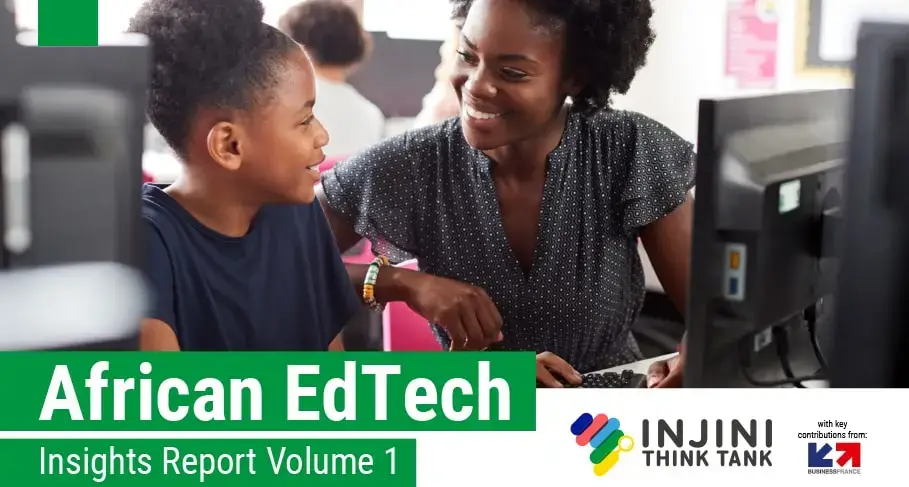The Injini Think Tank has recently announced its first African EdTech Insights Report. To advance EdTech innovation on the continent, a detailed grasp of the EdTech landscape is essential. The Injini Think Tank hopes that this research will throw light on the evolution of EdTech in Africa. The study outlines the substantial progress made thus far and the challenges that EdTech entrepreneurs and those who benefit from their solutions have experienced. It provides insights into the future by providing an overview of the African EdTech ecosystem.
EdTech has grown significantly in the last decade, especially as worldwide concerns like the COVID-19 pandemic forced students and teachers to seek alternate educational tools and answers. With pre-existing issues around essential resources such as clean water and sanitation, the introduction of EdTech in Africa has resulted in both successful results and additional challenges for the broader educational ecosystem. Learning poverty, or the lack of the ability to read with understanding by age 10³, remains excessively high in African countries. 60% of Africa’s population is under age 25, and literacy rates are low compared to other continents. This, combined with rising unemployment rates, paints a bleak picture of the future. However, EdTech can constructively upset the status quo without established education institutions and approaches.
Krista Davidson, Executive Director at Injini, stated:
With this first report, the Injini Think Tank wants to circulate interesting insights that we have distilled from our recent work, especially since publicly launching in April 2022. As an organisation, we want to promote knowledge exchange across the African education innovation ecosystem and intend to lead by example.
Davidson goes on to explain that some of the key outcomes of this report include sharing collected knowledge about the broad African education innovation ecosystem, aggregating current and future opportunities for EdTech startups throughout the continent, identifying risk factors that may affect the growth and sustainability of EdTech in the region and, importantly, strengthening the value proposition of EdTech in Africa.
Injini recognises that by making research findings more widely accessible to innovators and other stakeholders, it is likely to see more evidence-driven decision-making in the education sector, especially regarding education innovation in Africa. Additionally, by partnering with Business France, EdTech France, and Afinef, the platform can gain insights from Francophone Africa, making this report more representative of the diversity found across the continent.
The report showcases some of the work that the Injini Think Tank has conducted with various African EdTech companies as the only specialised entity dedicated to EdTech research in Africa. Through this collaborative approach, the Injini Think Tank identified key findings demonstrating the substantial growth of EdTech in Africa over the last few years. Although the sector is said to be in its infancy, funded startups grew from 210 EdTech solutions in 2020 to 419 in 2022 alone on the continent.
The report also highlights how the education landscape has changed following COVID-19 and how teachers, schools, and learners across the continent adapted to ensure minimal disruption to learning.
Notable trends identified in the report include:
- Increased adoption of online learning
- Steady growth of EdTech companies across the continent
- Greater incorporation of AI and gamification in learning tools
- Expansion of mobile learning
- Increase in partnerships between EdTech startups, traditional education providers, and governments.
The report also outlines the key challenges facing EdTech companies in Africa, including:
- English-centric EdTech solutions and associated language barriers
- Limited access to digital tools and internet connectivity
- Limited funding opportunities for EdTech startups
- Challenges related to working with governments and educational institutions
While the African EdTech Insights Report: Volume 1 does not provide a comprehensive picture of Africa’s EdTech ecosystem, it is an essential start towards understanding the continent’s EdTech innovation, investment, and growth.
Davidson concludes,
EdTech is still in its infancy, and there is no denying that COVID-19 accelerated its growth. However, there is still ample room for improvement and advancement. The research and this report show that Africa has its unique set of challenges, and we cannot rely solely on data or solutions from the global north to address them and ensure progress.
Founded in 2017, Injini is a registered non-profit company that exists to improve educational outcomes in sub-Saharan Africa. It remains the only EdTech-specialized accelerator in Africa. Injini’s various programmes and research, via the Injini Think Tank, all contribute towards its mission to increase the quality, accessibility, and relevance of education in the region. Injini is a member of the UVU Africa Group.
About the Injini Think Tank
The Injini Think Tank’s mission is to deliver research and advisory support on African education innovation. It aims to steer and house localised industry research through data-led publications, bespoke market research for EdTech entrepreneurs, open discussion platforms, community-building strategic initiatives and engagement on education policy.


